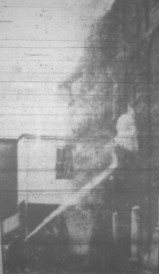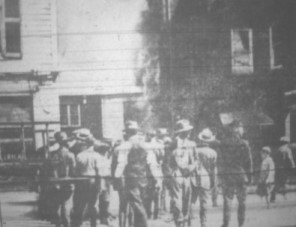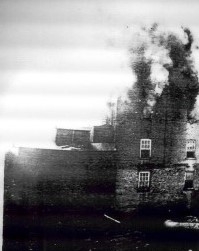Will Take Grain Cargo to Montreal and Maybe Across the Atlantic
[The Welland Tribune and Telegraph, 22 August 1922]
The steamer Modena from Christiania, Norway, passed up the canal a few days ago. The vessel is a small ocean “tramp” and came to the Great Lakes for a cargo of grain, which it will load at Milwaukee. It will carry the grain as far as Montreal at least; and may take it across the Atlantic.
It is evident that some vessel owners see business ahead in the Great Lakes-St. Lawrence River trade, for they are acquiring canal-size ships and bringing them back to the lakes. So far they have purchased six boats; some of which are now en route from the coast to the lakes.
The coming of the Modena is another indication that the route is considered an important one. Still another indication is the fact that the steamer, Andoste, a well-known Great Lakes “straightback,” has recently been cut down so as to permit her passage through the locks at the Welland Canal, one of the links in the route.
Fifty Per cent Increase in Business Over Last Year
[The Welland Tribune and Telegraph, 22 August 1922]
Up to date, 1922 shipments of binder twine received at the Fort William warehouse of the Plymouth Cordage Company, exceed any other year’s business in the history of the plant, according to information received by the Canadian Machinery. Five steamship cargoes have been unloaded at the warehouse.
The Plymouth people estimate the increase over last year as fifty per cent. The twine is being shipped to the Canadian West where it is being used upon the harvest fields of the prairies to garner the 1922 grain crop, as fast as it is received.
The total shipments of twine at Fort William since the opening of navigation reach 44,000,000 pounds. At 550 feet to the pound, the twine if made into a single strand, would measure 4,583.333 miles; long enough to circle the earth one hundred and eighty-three and a third times, or form twenty strands reaching from the earth to the moon.
Stumbled Against Bed in Weak Spell
[The Welland Tribune and Telegraph, 22 March 1922]
Alderman Alex. Griffiths had a rib broken as the result of a fall on Sunday. He took a weak spell in his room, and stumbled against the bed.
Dr. Colbeck, who had been attending the alderman during his long spell of sickness, says the injury is not serious.
Overheated Bearing Caused About $150,000 Damage Friday
FIREMEN WORK WELL
Are Complimented on Efficiency-Business as Usual Now
[The Welland Tribune and Telegraph, 25 July 1922]
 CLOSE UP
CLOSE UP
This picture taken for The Tribune and Telegraph shows a close up of the fire at Maple Leaf Mill on Friday. The camera man snapped it shortly after the alarm was sent in, just after the firemen had their first line laid and the water turned on.
A fire that will rank among the big three in the history of Welland broke out in the Riverside Mills of the Maple Leaf Milling Co., at eleven o’clock Friday morning, causing damage estimated by Robert Cooper, M.P.P., the local director of the company at $150,000.
An aid member of the Fire Department states that the only previous fires in the city approaching it in magnitude were those in Orient Hall (The Griffin Theatre Building) and the County Court House.
It was after three o’clock in the afternoon before the firemen left the scene after four hours of about as strenuous work as has ever fallen to the lot of the Welland Fire Department.
Robert Cooper is authority for the statement that the good work of the city brigade, coupled with the able assistance of the firemen of the Empire Cotton Mills and the Crowland Department, saved the city from a conflagration that might well have vexed the Riverside Mills and swept over a large area of adjoining property. He stated that a mill fire of this nature is among the hardest to combat, and his words of praise were evidently intended to convey no small meed of appreciation to the three bodies of firemen who did their duty and did it well.
As a result of their efforts, the fire was confined to the mill whose walls stand intact. The large loss lies in the mill machinery and the damage to the raw material and finished products and the mill interior.
The cause of the fire was an overheated journal or bearing. Rumors current that the fire was due to spontaneous combustion was corrected by Mr. Cooper who stated that the mill had been thoroughly cleaned from top to bottom a day or so before the fire.
The insurance adjusters were in the city and placed the loss on the grain and flour. Damage to machinery has not yet been settled.
The efficiency of the organization of the mill stood the test, for yesterday farmers of the County were being looked after as if nothing had happened. All kinds of grain was being sold the same as ever with the exception of wheat. And it is expected that the choppers will be ready in a couple of weeks.
A meeting of the directors will be held shortly, when the question of rebuilding the mill will be decided one way or the other.
It is said an employee discovered flames on the purifying floor or second story of the mill in a pile of sacks, which he first endeavored to boar out. Failing in this, he brought the fire hose, with which the mill is equipped, to the spot and ran back to turn on the water. He then heard an explosion and by the time of his return was met with an outburst of flames which quickly drove him from the floor.
Heard Explosion
A. Kelly, whose blacksmith shop is located some rods to the east of the mill, says that while sitting in his shop he heard a noise followed by a jar which lead him to suppose that a heavy weight had landed on the roof of the building. He then saw people running down the alley leading to his shop, and going to the door, saw large volumes of smoke bursting from the windows of the mill on the east side.
He states that he heard a second explosion about four minutes after the first concussion.
His story is corroborated by that of A.J. Eiler, whose tailor shop is in the immediate vicinity. He also heard in the mill a sound which he described as resembling the bursting of an automobile later followed by a second noise resembling an explosion a few minutes later.
Traffic was reopened at 2.45, three hours and fifteen minutes after the sounding of the alarm.

| Here is a view of the Maple Leaf Mill fire, taken from East Main Street. The photo was taken very soon after the smoke was first seen and shows the start the blaze had on the firemen. Smoke poured from every window of the mill, compelling the fire companies to fight from the outside. Do you recognize the man in uniform to the right of the picture? |
Saw Fire First
Among the first to observe the outbreak of the fire was A.E. Douglass, whose store faces the lane leading to the mill, on the opposite side of Main street. His attention was attracted by an outpouring of smoke from the second story of the building on the west side. R.L. McGregor, of the Douglass store, at once rushed to Box 21 at the corner of South Main street, and turned in the alarm, while Mr. Douglass ran across the street to the mill, where he found the occupants of the office unaware of anything wrong. Employees of the mill followed with the alarm immediately upon Mr. Douglass’ entrance.
Within a few minutes of his arrival at the scene, and realizing the seriousness of the situation, Chief Stapf ordered word sent to Crowland Department to hold themselves in readiness as the chief had then issued orders bringing all the available hose of the city into use.
A request for all soon followed, but the Crowland Department were already on their way, Chief Jones having ascertained something of the extent of the blaze, and bringing the assistance of the Crowland brigade without waiting to be called upon.
The Empire Cotton Mills had their men on the spot about as soon as the city department. J.D. Payne and his men lost no time in getting there, and these two organizations rendered much valuable aid to the Welland department.
Robert Cooper was at his farm at the time of the outbreak, from whence he was summoned by telephone, and came into the city at once. From his knowledge of the layout of the mill, Mr. Cooper was enabled to offer some valuable suggestions to those fighting the flames.
 Under the direction of Chief of Police Crabb, Main street was roped off from the Ross Company store to Cross street. Street car service was suspended in this area, and all automobile and other traffic diverted to the side streets.
Under the direction of Chief of Police Crabb, Main street was roped off from the Ross Company store to Cross street. Street car service was suspended in this area, and all automobile and other traffic diverted to the side streets.
The police force did good work in seeing that the work of the firemen was not hampered by the large crowd gathered to witness the spectacle.
The fire brought the services of the new La France pumper into play for the first time and the work done by the machine amply demonstrated the good judgment of the city council in making it part of the department equipment. The pumper was stationed on the bridge across the lane at the west and north end of the mill, drawing water from the canal adjoining, and a pressure adequate to the demands was maintained.
The pumper stood the test and proved to be a splendid investment for the city. One hundred and forty pounds pressure was maintained for two hours and a half without a break. Two streams delivered over 650 gallons a minute.
A total of twelve streams was played on the building by the firemen.
Three Hurt
Three members of the department maintained injuries in the course of the fight. Roy Strawn and James Vallencourt had their hands cut by breaking glass; and H.R.Waldon suffered an injury to his eye. Fortunately, all three cases were not serious.
John Pointer Ran Into Hard Luck Yesterday
[The Welland Tribune and Telegraph, 18 May 1922]
Sixty-eight years old. Rich yesterday. Poor today.
Such is the story told of John Pointer, a comparatively well-known character of Welland.
It was Chief Crabbe who told the story to the Tribune and Telegraph today, and it is Chief Crabbe who is trying to get John on his feet again.
The old man had been doing odd jobs around the city for some time and among other things had looked after the Chief’s dog.
He scrimped and saved for weeks until four weeks ago he had gathered together $75. Then he bought a horse from Toronto for $60, paying $11 to have it transported to Welland.
Settling on a little place in Crowland close to the Cotton Mills, he started out to be independent, working up in a few days a nice cartage business.
Last night, John went out to the building where he keeps his horse, to find it lying on the ground unable to rise. An examination proved that the animal had broken its leg somehow.
Chief Crabbe had to go up and shoot it later in the evening.
Disaster at sixty eight years is serious. But it would not take much to give John a start again. Those who feel the urge should get in touch with the Chief.
Peddler Fined
Oscar Schendelhom was fined $10 and $5 costs in City Police Court this morning for peddling goods without first obtaining a license. He pleaded guilty admitting he was going from house to house with his wares. The case which came within a city bylaw was proved by Officer Barkwill.
[The Welland Tribune and Telegraph, 6 July 1922]
R.D. Spencer, Experimenting, Started Bad Blaze
Quick action by the Fire Department averted what might have been a bad blaze Monday evening, when an alarm from Box 42 summoned them to the residence of R.D. Spencer, corner Myrtle Avenue and Spencer Street.
Mr. Spencer was experimenting with certain chemicals in his garage, using a large kettle for the purpose. Combustion unexpectedly ensued, and the experimenter was unable to check the flames. No time was lost, however, in turning in an alarm, and the department was equally prompt in getting to the scene. The chemical was brought into play, and the fire subdued before any damage of consequence had been done to the building.
The loss was confined to the chemicals, which were of nominal value, and to stains on the interior walls of the building, which a coat of paint will remedy.
Fire: 3 July 1922
 Subscribe..
Subscribe..
 CLOSE UP
CLOSE UP
 Under the direction of Chief of Police Crabb, Main street was roped off from the Ross Company store to Cross street. Street car service was suspended in this area, and all automobile and other traffic diverted to the side streets.
Under the direction of Chief of Police Crabb, Main street was roped off from the Ross Company store to Cross street. Street car service was suspended in this area, and all automobile and other traffic diverted to the side streets.